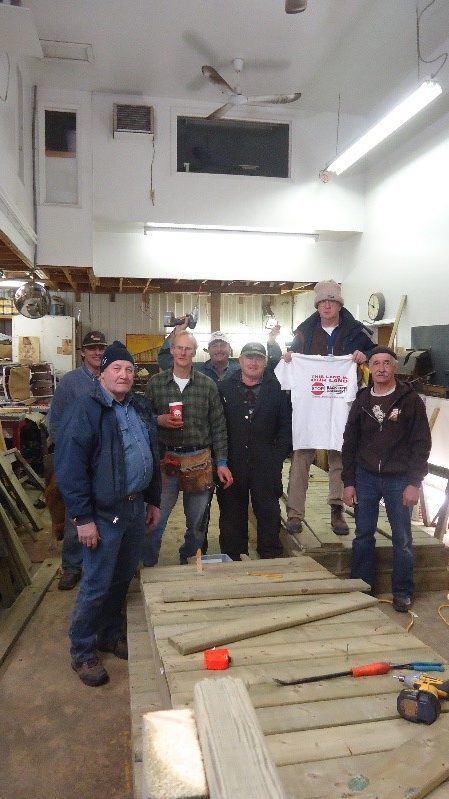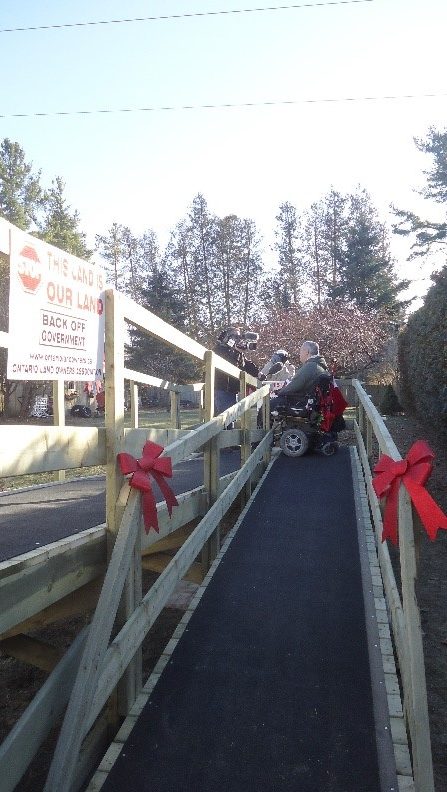
Many years ago, the president of the Ontario Landowners Association, Jack MacLaren, farmer and seed salesman, decided to take a stab at being an MPP at Queen’s Park. There was a conservative MPP already in the position and had been for 30 years, but the rural people were having problems with various levels of government and no solutions seemed to be coming forth. The Liberal government was in power at the time. At the leadership convention, Jack won and became our MPP. He did not have a government attitude but rather a landowner attitude which was if there is a problem, you solve it. Despite all the pushback against such an innovative idea, he tried to carry that message through to those who called him for help. One of the many examples of the success of this technique was the “Ramp for Larry” story. One day, a reporter called Jack to ask his opinion on a story that was in the news. In March of 2011. Larry Torrington lost his right leg below the knee due to complications from diabetes and had been in hospital getting therapy for 5 months. He was due for release in August but was unable to go home because he needed government funding to be able to build a wheelchair accessible ramp to his home. The call came to Jack less than 2 weeks before Christmas. Larry had been in the hospital 3 months longer than necessary. When the reporter asked Jack for his opinion on the government’s failure in this situation, he was not expecting the answer he got. “A ramp,” said Jack. I know how to build a ramp and I know lots of rural guys who do also. We can build him that ramp and get him home for Christmas…and he did. A small group of guys went to Larry’s house and measured the yard and set about designing the ramp. Then off to a lumber store where the bulk of the material was donated to help out. Bob Ralph offered his shop in Richmond to build the sections for the ramp which was installed in Larry’s yard just days before Christmas. It was a small example of what ordinary people can do when they set their minds to it.



Another example of get’er done was when a worried mother called on a Friday to Jacks office. He answered the phone and she told him her story of trying for two years to get the school bus to come to her street so that she didn’t have to wait with her autistic son, at a busy intersection. Calls to bus lines, school boards etc. had not yielded her any movement. Jack said, “I’ll be over to see your situation” and he did. The next week, the bus stopped at her house.
When I hear stories about bad water in some of our reservations, I think, we know well drillers. Why can’t they just go and dig some wells. The answer eludes me. Part of it could be politics or red tape or perhaps people who are not ‘solution-driven’. We’ve heard them all before. Can’t clean that ditch until we hire a consulting firm and do a study and pay them $100,000 before we put the report on the self and two years later, still a clogged ditch.
The City of Ottawa has 90 planners working on figuring out how to plan for our future, and they are pretty determined that they will get rid of oil and gas and maybe outlaw wood heat. “Who knows?” Their meetings are moving along without the public consultation in person because, you know, can’t have meetings. We hear that windmills are coming to Ottawa. Does anyone have a plan for where they are going? Whose farm fields will be destroyed?
I have heard many smart men and women talking about the problems of getting rid of oil and gas and living on electricity only. I remember well, the ice storm of ’98 and how our 400 family community of Munster Hamlet was in crisis. That was the only source of heat for those houses and they were desperate. No oil, no gas and no wood stoves and it was winter. The people all left to stay with friends or relatives in Ottawa, a few stayed behind with candles, huddled under blankets heating the room to save an expensive piano. What goes through the minds of bureaucrats that they would even think of getting rid of oil, gas and wood heat when we live in a country that is so cold for at least 1/3rd of the year and is covered with renewable trees. Did anyone watch the news recently when Texas had a deep cold freeze and people were stranded with no food or water or heat. The windmills sat idle. The City of Ottawa shouldn’t put all their eggs in one basket. We need several sources of heat to get through our winters.
It is time to bring common sense into the minds of those rule makers who think they are going green and saving the world. Take a look at all the problems that have happened elsewhere with wind power. The wind doesn’t blow when you need it, windmills often don’t turn at night, or in the very hot summers or in the extreme cold winters, so they don’t work when you need them. Not to mention the huge truckloads of cement that are beneath each windmill. The creation of cement is one of the biggest releases of CO2 into the atmosphere. Windmills coming into rural communities have been very detrimental to the community as a whole, pitting neighbours against neighbours. The windmills that we visited in southern Ontario had houses on them and everyone we talked to, were renters. The cheap rent enabled them to put up with the constant whoosing noise and sun flicker. We need to put a stop to this insanity. We need that land to grow food on.
Whether it’s an unwanted designation, destructive bylaws or rules that make no sense, our message to the City of Ottawa should be clear: Leave our farmland alone!
Reprinted with permission from the Landowner Voices. To see more great stories, visit Landowner-Voices-May-June-2021.pdf (ontariolandowners.ca).
